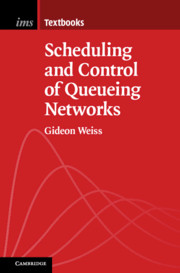Refine listing
Actions for selected content:
9096 results in Communications, Signal Processing and Information Theory
6 - Scaling of G/G/1 and G/G/∞
- from Part II - Approximations of the Single Queue
-
- Book:
- Scheduling and Control of Queueing Networks
- Published online:
- 01 October 2021
- Print publication:
- 14 October 2021, pp 83-101
-
- Chapter
- Export citation
Part V - Diffusion Scaled Balanced Heavy Traffic
-
- Book:
- Scheduling and Control of Queueing Networks
- Published online:
- 01 October 2021
- Print publication:
- 14 October 2021, pp 257-258
-
- Chapter
- Export citation
Frontmatter
-
- Book:
- Scheduling and Control of Queueing Networks
- Published online:
- 01 October 2021
- Print publication:
- 14 October 2021, pp i-iv
-
- Chapter
- Export citation

Scheduling and Control of Queueing Networks
-
- Published online:
- 01 October 2021
- Print publication:
- 14 October 2021
20 - Accuracy and Stability of Deep Learning for Compressive Imaging
- from Part V - From Compressed Sensing to Deep Learning
-
- Book:
- Compressive Imaging: Structure, Sampling, Learning
- Published online:
- 16 July 2021
- Print publication:
- 16 September 2021, pp 470-500
-
- Chapter
- Export citation
8 - Analysis of Optimization Algorithms
- from Part II - Compressed Sensing, Optimization and Wavelets
-
- Book:
- Compressive Imaging: Structure, Sampling, Learning
- Published online:
- 16 July 2021
- Print publication:
- 16 September 2021, pp 166-187
-
- Chapter
- Export citation
6 - The LASSO and its Cousins
- from Part II - Compressed Sensing, Optimization and Wavelets
-
- Book:
- Compressive Imaging: Structure, Sampling, Learning
- Published online:
- 16 July 2021
- Print publication:
- 16 September 2021, pp 129-141
-
- Chapter
- Export citation
Appendix B - Functional Analysis
- from Appendices
-
- Book:
- Compressive Imaging: Structure, Sampling, Learning
- Published online:
- 16 July 2021
- Print publication:
- 16 September 2021, pp 537-541
-
- Chapter
- Export citation
Epilogue
-
- Book:
- Compressive Imaging: Structure, Sampling, Learning
- Published online:
- 16 July 2021
- Print publication:
- 16 September 2021, pp 521-524
-
- Chapter
- Export citation
10 - A Taste of Wavelet Approximation Theory
- from Part II - Compressed Sensing, Optimization and Wavelets
-
- Book:
- Compressive Imaging: Structure, Sampling, Learning
- Published online:
- 16 July 2021
- Print publication:
- 16 September 2021, pp 222-236
-
- Chapter
- Export citation
Notation
-
- Book:
- Compressive Imaging: Structure, Sampling, Learning
- Published online:
- 16 July 2021
- Print publication:
- 16 September 2021, pp 563-566
-
- Chapter
- Export citation
14 - Infinite-Dimensional Compressed Sensing
- from PART III - Compressed Sensing with Local Structure
-
- Book:
- Compressive Imaging: Structure, Sampling, Learning
- Published online:
- 16 July 2021
- Print publication:
- 16 September 2021, pp 334-348
-
- Chapter
- Export citation
3 - A Short Guide to Compressive Imaging
- from Part I - The Essentials of Compressive Imaging
-
- Book:
- Compressive Imaging: Structure, Sampling, Learning
- Published online:
- 16 July 2021
- Print publication:
- 16 September 2021, pp 47-74
-
- Chapter
- Export citation
16 - Recovery Guarantees for Wavelet-Based Compressive Imaging
- from Part IV - Compressed Sensing for Imaging
-
- Book:
- Compressive Imaging: Structure, Sampling, Learning
- Published online:
- 16 July 2021
- Print publication:
- 16 September 2021, pp 373-402
-
- Chapter
- Export citation
12 - Local Structure and Nonuniform Recovery
- from PART III - Compressed Sensing with Local Structure
-
- Book:
- Compressive Imaging: Structure, Sampling, Learning
- Published online:
- 16 July 2021
- Print publication:
- 16 September 2021, pp 267-304
-
- Chapter
- Export citation
2 - Images, Transforms and Sampling
- from Part I - The Essentials of Compressive Imaging
-
- Book:
- Compressive Imaging: Structure, Sampling, Learning
- Published online:
- 16 July 2021
- Print publication:
- 16 September 2021, pp 30-46
-
- Chapter
- Export citation
PART III - Compressed Sensing with Local Structure
-
- Book:
- Compressive Imaging: Structure, Sampling, Learning
- Published online:
- 16 July 2021
- Print publication:
- 16 September 2021, pp 237-240
-
- Chapter
- Export citation
Appendix D - Convex Analysis and Convex Optimization
- from Appendices
-
- Book:
- Compressive Imaging: Structure, Sampling, Learning
- Published online:
- 16 July 2021
- Print publication:
- 16 September 2021, pp 546-552
-
- Chapter
- Export citation
Dedication
-
- Book:
- Compressive Imaging: Structure, Sampling, Learning
- Published online:
- 16 July 2021
- Print publication:
- 16 September 2021, pp v-vi
-
- Chapter
- Export citation
19 - Deep Learning for Compressive Imaging
- from Part V - From Compressed Sensing to Deep Learning
-
- Book:
- Compressive Imaging: Structure, Sampling, Learning
- Published online:
- 16 July 2021
- Print publication:
- 16 September 2021, pp 458-469
-
- Chapter
- Export citation
